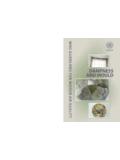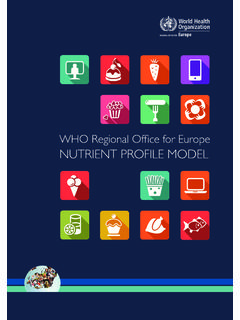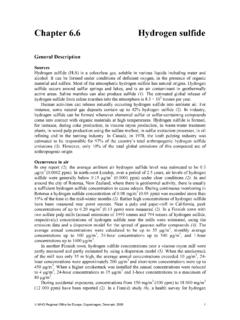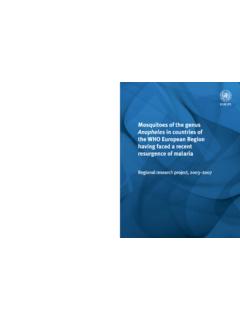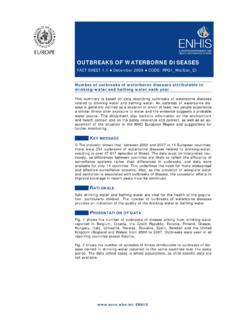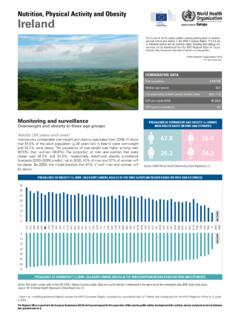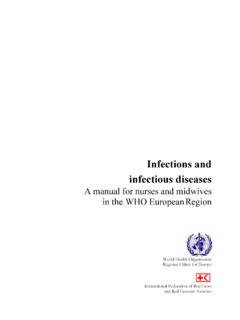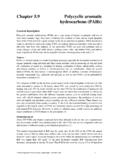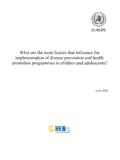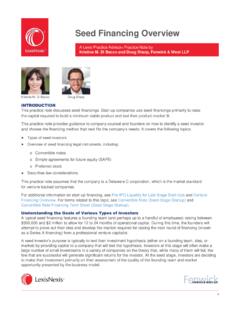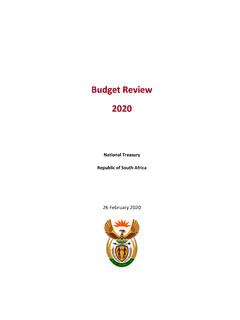Transcription of HealtH financing policy - World Health Organization
1 The HealtH financing policy Papers series profiles technical work managed by the WHO Regional Office for Europe provision of services to support Member States Stewardship of financing purchasing of services individuals pooling of funds collection of funds HealtH financing policy : a guide for decision-makers EUR/08/5085965. WHO Regional Office for Europe Scherfigsvej 8, DK-2100 Copenhagen , Denmark Tel.:+45 39 17 17 17. Fax: +45 39 17 18 18. E-mail: HealtH financing policy Paper 2008/1. HealtH financing policy : a guide for decision-makers Joseph Kutzin HealtH financing policy Paper, Division of Country HealtH Systems The WHO Barcelona Office for HealtH Systems Strengthening Part of the WHO Regional Office for Europe, the WHO Barcelona Office for HealtH Systems Strengthening promotes better performing HealtH systems through the application of a resultsoriented approach that enables the transformation of WHO's core values into practical tools for the diagnosis and development of HealtH system policies, particularly HealtH financing policy .
2 Through a combination of diagnosis of the HealtH system, an analysis of options, the management of country-based policy analysis programmes, and high-level policy dialogue in which recommendations are made, the Office supports countries in organizing HealtH policy analysis and strengthening the link between evidence and policy -making. The Office also leads activities for capacity building and institutional development for HealtH financing and policy analysis at the national and regional levels. The WHO Regional Office for Europe The World HealtH Organization (WHO) is a specialized agency of the United Nations created in 1948 with the primary responsibility for international HealtH matters and public HealtH . The WHO Regional Office for Europe is one of six regional offices throughout the World , each with its own programme geared to the particular HealtH conditions of the countries it serves. One of WHO's constitutional functions is to provide objective and reliable information and advice in the field of human HealtH and HealtH systems.
3 It fulfils this responsibility in part through its publications programmes, seeking to help countries make policies that benefit public HealtH and address their most pressing public HealtH concerns. Member States Albania Greece Republic of Moldova Andorra Hungary Romania Armenia Iceland Russian Federation Austria Ireland San Marino Azerbaijan Israel Serbia Belarus Italy Slovakia Belgium Kazakhstan Slovenia Bosnia and Herzegovina Kyrgyzstan Spain Bulgaria Latvia Sweden Croatia Lithuania Switzerland Cyprus Luxembourg Tajikistan Czech Republic Malta The former Yugoslav Denmark Monaco Republic of Macedonia Estonia Montenegro Turkey Finland Netherlands Turkmenistan France Norway Ukraine Georgia Poland United Kingdom Germany Portugal Uzbekistan II HealtH financing policy : a guide for decision-makers Abstract This paper elaborates an approach to HealtH financing policy that countries can adapt to their own na- tional context. This entails: (1) specification of a set of HealtH finance policy objectives, grounded in the core values espoused by WHO; (2) a conceptual framework for analysing the Organization and functions of the HealtH financing system; and (3) recognition of the way in which key contextual factors, particu- larly fiscal constraints, affect a country's ability to attain policy objectives or implement certain types of reforms.
4 Because of the great diversity of national contexts, there is no blueprint no particular model or system of financing that is appropriate for all countries. Hence, while the approach is fundamentally grounded in a common set of values and objectives, it permits analysis and recommendations that are country-specific and realistic. Key messages for decision-makers are to identify and address the harmful consequences of fragmentation in financing arrangements, and to ensure that the instruments of HealtH financing policy are consistently aligned with the objectives. Keywords financing , HealtH . HealtH ECONOMICS. DELIVERY OF HealtH CARE - economics HealtH policy . policy MAKING. EUROPE. EUR/08/5085965. Address requests about publications of the WHO Regional Office for Europe to: by e-mail (for copies of publications) (for permission to reproduce them) (for permission to translate them). by post Publications WHO Regional Office for Europe Scherfigsvej 8.
5 World HealtH Organization 2008. All rights reserved. The Regional Office for Europe of the World HealtH Organization welcomes requests for permission to reproduce or translate its publications, in part or in full. The designations employed and the presentation of the material in this publication do not imply the expression of any opinion whatsoever on the part of the World HealtH Organization concerning the legal status of any country, territory, city or area or of its authorities, or concerning the delimitation of its frontiers or boundaries. Where the designation country or area appears in the headings of tables, it covers countries, territories, cities, or areas. Dotted lines on maps represent approximate border lines for which there may not yet be full agreement. The mention of specific companies or of certain manufacturers' products does not imply that they are endorsed or recommended by the World HealtH Organization in preference to others of a similar nature that are not mentioned.
6 Errors and omissions excepted, the names of proprietary products are distinguished by initial capital letters. The World HealtH Organization does not warrant that the information contained in this publication is complete and correct and shall not be liable for any damages incurred as a result of its use. The views expressed by authors or editors do not necessarily represent the decisions or the stated policy of the World HealtH Organization . HealtH financing policy : a guide for decision-makers III. Acknowledgments This paper was prepared by Joseph Kutzin, Regional Advisor for HealtH Systems financing , WHO Re- gional Office for Europe. The author is very grateful to the following people for the input they provided regarding the focus, Organization , and content of the paper: Antonio Duran, Tamas Evetovits, Peter Gaal, Melitta Jakab, Jenni Kehler, Nata Menabde, Claudio Politi and Jens Wilkens. Thanks as well to Susan Ahrenst, Juan F. Garc a Dom nguez and Cathal Connaughton who provided support in laying out and finalizing this report.
7 IV HealtH financing policy : a guide for decision-makers Contents Purpose of the paper and overview .. 1. Three pillars of HealtH financing policy .. 1. First pillar: proposed objectives for HealtH financing policy .. 3. Second pillar: framework for understanding the Organization of HealtH financing systems .. 9. Third pillar: incorporating fiscal constraints and other contextual factors .. 13. Critical challenges for policy : fragmentation and alignment .. 18. Recognizing, reducing or addressing the consequences of fragmentation .. 18. Aligning reform instruments with policy objectives .. 19. Conclusions: principles and practical steps for policy -makers .. 21. References .. 24. HealtH financing policy : a guide for decision-makers V. Purpose of the paper and overview 1. The countries of WHO's European Region, like all countries in the World , face difficult challenges and choices in financing their HealtH systems. New medicines and other technological developments, rising expectations and aging populations fuel increased demand and hence put upward pressure on system costs.
8 Concurrently, macroeconomic, demographic, and fiscal constraints limit the extent to which governments can simply allocate more public revenues for HealtH . The combination of upward pressure on costs and limitations on the ability of governments to increase spending forces countries to consider reforms to the way that their HealtH systems are financed. 2. There is no single answer to the question of how to finance HealtH systems. Not only do the specific challenges faced by countries differ, each country already has a system of HealtH financing that has developed over a period of time. In many countries of the European Region, the basic features of national HealtH financing systems have been in place for decades (in some cases, more than 50 or even 100 years) and are a part of national cultural identity ( the United Kingdom's National HealtH Service, or Germany's social HealtH insurance system) (1). In such countries, debates on reform of the financing system have more to do with changes at the margin rather than wholesale organizational change.
9 In many other countries of the Region, however, particularly those directly involved in the transitional process that began in 1990, HealtH financing systems can be more narrowly considered as a set of technical arrangements without the strong cultural/historical overlay. And in many of these countries, more fundamental HealtH financing reforms have been implemented or are under consideration. 3. The WHO Regional Office for Europe must be able to support each country in the Region in responding to its particular challenges and priorities in its own context. This requires having an approach that is technically sound and solidly grounded in the shared values and goals of WHO and its Member States, yet flexible enough to be adapted to the diverse systems and contexts of the Region, thereby making it possible to provide useful analysis and concrete recommendations and advice. This is what we propose here: a way for countries to approach HealtH financing policy in their own national context.
10 Three pillars of HealtH financing policy 4. Our approach is built on three pillars (Fig. 1). We begin with a set of objectives for HealtH finance policy that are applicable to all countries, grounded in the core values espoused by WHO (2) and derived from the framework given in The World HealtH report 2000 (3). These provide the direction in which reforms should try to push the system. As such, the proposed policy objectives also serve as criteria against which the effects of reforms to HealtH financing systems can be assessed. The second pillar is a conceptual framework for analysing the Organization of national HealtH financing systems. This is used to describe the functions and policies associated with all HealtH financing systems, irrespective of the model or label used to classify them. Use of such a HealtH financing policy : a guide for decision-makers 1. descriptive framework is essential for tailoring analysis to the consideration of specific reforms in specific country contexts, because the way in which a HealtH financing system is currently organized provides the starting point from which any reform begins.
